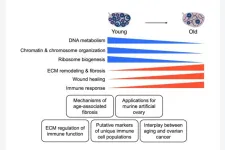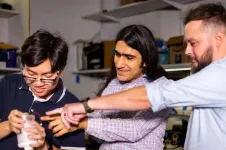Researchers from Queen Mary University of London have gathered detailed insights from the British South Asian community that could lead to more successful implementation of genetic testing to help tailor the use of routine medications. Their findings are published today (1 November 2023) in The Pharmacogenomics Journal and indicate key issues that could affect the take up of this new type of genetic testing amongst patients.
Despite comprising 10% of the British population, individuals of South Asian heritage have historically been under-represented in genomics studies and clinical trials. British Bangladeshis and British Pakistanis particularly have higher rates of several medical conditions such as diabetes and heart disease, and taking multiple medications for these conditions increases the risks of side effects.
Using DNA testing to personalise medication regimes has been proven to decrease the risk of side effects and enhance the efficacy of medications, but there has been little discussion about these new genetic tools outside specialised health settings.
This study brought people from the British Bangladeshi and British Pakistani communities together to identify what they felt to be the most critical elements about the development of clinical services that undertake genetic testing, either to tailor the use of medications or to research optimised medication use.
Researchers led by Dr Emma Magavern and the Genes & Health Community Engagement Team at Queen Mary University of London, carried out focus groups drawn from existing participants in the Genes & Health cohort. 64% of the participants were female, 26% were born in the UK or Europe, with 52% born in Bangladesh and 17% born in Pakistan. 36% reported university level education. Simultaneous translation into Urdu and Bengali was available to all participants.
The findings
The study found that trust was the most important factor in encouraging British South Asians to engage with genetic testing. GPs were felt to be trustworthy medical professionals who could invite individuals to take part in genetic testing, either for research or to ensure their own medications were optimised.
Participants also felt that personalised prescribing with genetic information could enhance trust and contribute to people taking their medication as prescribed more regularly.
Emma Magavern, from the from the Centre of Clinical Pharmacology and Precision Medicine at Queen Mary and lead author, said:
“Trust was the key condition for the acceptability of using DNA to tailor a patient’s medication, and for using those genetic results in research. Community presence in research cohorts was perceived to enhance trust, as does education, outreach, and communication.”
Mehru Raza, the Communications & Engagement Manager for Genes & Health said:
“Insights from often-overlooked perspectives in clinical research underscore the critical significance of fostering trust and engaging participants in the research process. Making information accessible and embedded in the community is the key to restoring community confidence in advancements within healthcare.”
Participants voiced some concerns about this use of genetic testing, raising issues including privacy, data ownership, and transparency if any data breaches occur. Participants were also concerned that use of this data could make medicines more expensive for the community. These issues must be addressed as this technology is adopted more widely.
The study also found that participants broadly shared a view that misinformation around the COVID-19 pandemic and vaccines had eroded trust between the community and health care. Rebuilding this trust was possible and required high quality and accessible information about any new developments in clinical care.
This work was funded by the National Institute for Health and Care Research Barts Biomedical Research Centre and Barts Charity.
Director of Funding and Impact at Barts Charity, Victoria King, said:
“As one of the UK’s most diverse areas, East London has unique healthcare challenges. We are proud to have supported this work, which could lead to more people in our local community with South Asian heritage accessing personalised treatment for their conditions. These treatments tend to be more effective and cause fewer side effects, meaning people can live longer, healthier lives.”
ENDS
NOTES TO EDITORS
Contact:
Honey Lucas
Faculty Communications Officer – Medicine and Dentistry
Queen Mary University of London
Email: h.lucas@qmul.ac.uk
About the research
Emma F. Magavern, Faiza Durrani, Mehru Raza, Robin Lerner, Mohammed Riadul Islam, Genes & Health Research Team, Megan Clinch, and Mark J. Caulfield. ‘British South Asian ancestry participants views of pharmacogenomics clinical implementation and research: a thematic analysis. The Pharmacogenomics Journal
DOI: 10.1038/s41397-023-00317-8
A copy of the paper will be available after publication.
This work forms part of the portfolio and was funded by the National Institute for Health Research Barts Biomedical Research Centre. Barts Charity currently funds Dr Magavern.
About Queen Mary
www.qmul.ac.uk
At Queen Mary University of London, we believe that a diversity of ideas helps us achieve the previously unthinkable.
Throughout our history, we’ve fostered social justice and improved lives through academic excellence. And we continue to live and breathe this spirit today, not because it’s simply ‘the right thing to do’ but for what it helps us achieve and the intellectual brilliance it delivers.
Our reformer heritage informs our conviction that great ideas can and should come from anywhere. It’s an approach that has brought results across the globe, from the communities of east London to the favelas of Rio de Janeiro.
We continue to embrace diversity of thought and opinion in everything we do, in the belief that when views collide, disciplines interact, and perspectives intersect, truly original thought takes form.
About the NIHR Barts Biomedical Research Centre (BRC)
The NIHR Barts Biomedical Research Centre (BRC) is part of the National Institute for Health and Care Research (NIHR) and is a delivery partnership of Barts Health NHS Trust, Queen Mary University of London, St George’s, University of London and St George’s University Hospitals NHS Foundation Trust hosted by Barts Health NHS Trust.
The BRC brings around 7.5 million patients together with outstanding science and enables ground-breaking discoveries to be translated into life-saving treatments. By offering every patient the chance to engage in research we maximise the benefit of new diagnoses and therapies for people with rare and common disease.
About Genes & Health
Genes & Health is core-funded by Wellcome, the Medical Research Council, Higher Education Funding Council for England Catalyst, Barts Charity, and Health Data Research UK. Queen Mary’s Genes & Health group are trying to reduce health inequalities by analysing the genetic information of 100,000 Bangladeshi and Pakistani people to improve health outcomes locally and globally.
About Barts Charity
As East London’s oldest healthcare charity, we’ve been at the forefront of advancing healthcare for hundreds of years. The hospitals we support provide excellent care to their patients. Yet too many people’s lives in East London are affected by ill health.
At Barts Charity we have East London in our hearts and we want healthier, longer lives for everyone in our community.
As the dedicated charity for Barts Health NHS Trust, we support St Bartholomew’s, Whipps Cross, Newham, Royal London, and Mile End hospitals, as well as the Faculty of Medicine and Dentistry at Queen Mary University of London. We also support researchers at the School of Health & Psychological Sciences at City, University of London. Visit https://www.bartscharity.org.uk
About the National Institute for Health and Care Research (NIHR)
The mission of the National Institute for Health and Care Research (NIHR) is to improve the health and wealth of the nation through research. We do this by:
Funding high quality, timely research that benefits the NHS, public health and social care;
Investing in world-class expertise, facilities and a skilled delivery workforce to translate discoveries into improved treatments and services;
Partnering with patients, service users, carers and communities, improving the relevance, quality and impact of our research;
Attracting, training and supporting the best researchers to tackle complex health and social care challenges;
Collaborating with other public funders, charities and industry to help shape a cohesive and globally competitive research system;
Funding applied global health research and training to meet the needs of the poorest people in low and middle income countries.
NIHR is funded by the Department of Health and Social Care. Its work in low and middle income countries is principally funded through UK Aid from the UK government.
END




